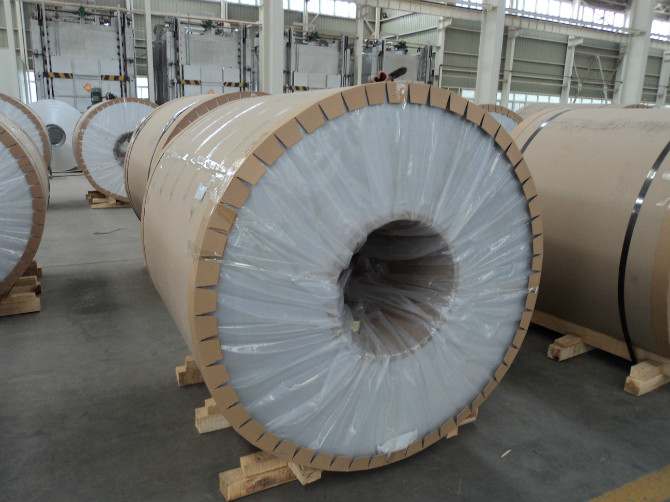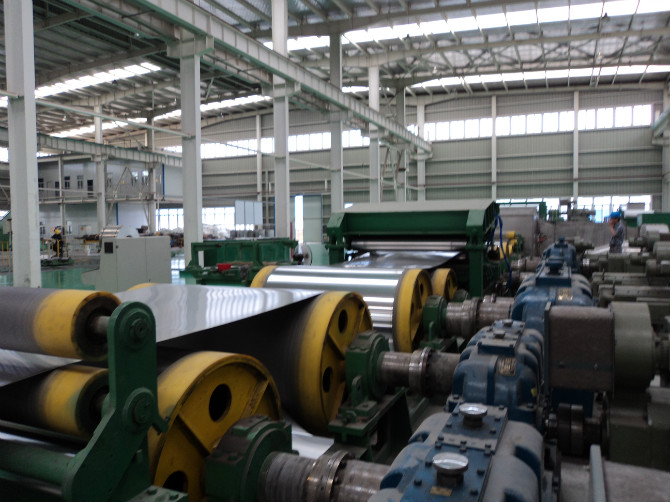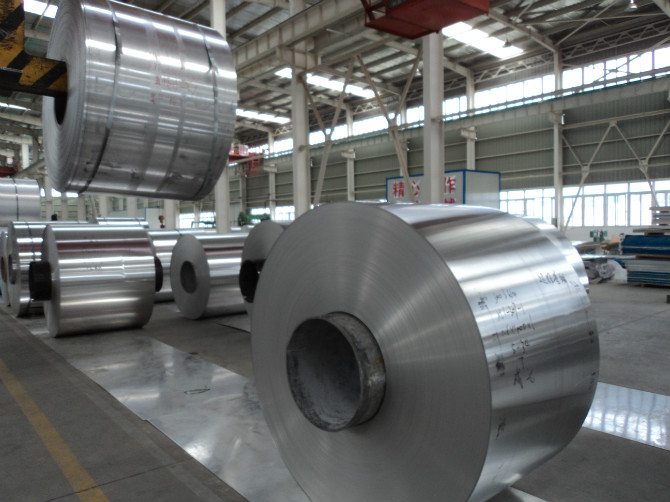Aluminum zinc coils are a coil product that has been hot-dip coated with an aluminum-zinc alloy layer. This process is often referred to as Hot-dip Aluzinc, or simply Al-Zn plated coils. This treatment results in a coating of aluminum-zinc alloy on the surface of the steel coil, which improves the corrosion resistance of the steel.
Galvalume Steel Coil Manufacturing Process
1. Surface treatment: Firstly, the steel coil is subjected to surface treatment, including oil removal, rust removal, surface cleaning and other processes, to ensure that the surface is clean and smooth and to increase the adhesion with the coating.
2. Pre-treatment: The surface-treated steel coils are fed into the pre-treatment tank, which usually undergoes pickling, phosphating, etc. to form a protective layer of zinc-iron alloy and enhance the adhesion with the coating.
3. Coating Preparation: Aluminum-zinc alloy coatings are usually prepared from solutions of aluminum, zinc and other alloying elements by specific formulations and processes.
4. Hot-dip plating: Pre-treated steel coils are immersed in an aluminum-zinc alloy solution through a hot-dip plating bath at a certain temperature, which causes a chemical reaction between the surface of the steel coil and the aluminum-zinc solution to form a uniform aluminum-zinc alloy coating. Normally, the temperature of the steel coil is controlled within a certain range during the hot-dip plating process to ensure the uniformity and stability of the coating.
5. Cooling and Curing: The hot-dip coils are cooled to cure the coating and form a complete aluminum-zinc alloy protective layer.
6. Post-treatment: After hot-dip plating is completed, surface treatment of the coating is usually required, such as applying anti-corrosion agents, cleaning, drying, etc., in order to improve the corrosion resistance of the coating.
7. Inspection and packaging: Aluminum-zinc plated steel coils are subjected to quality inspection, including appearance inspection, coating thickness measurement, adhesion test, etc., and then packaged after passing to protect the coating from external damage.
Advantages of Galvalume Coil
1. Excellent corrosion resistance: Aluminized zinc coils have excellent corrosion resistance under the protection of aluminum-zinc alloy coating. The alloy composition of aluminum and zinc enables the coating to provide effective protection against corrosion in a wide range of environments, including acidic, alkaline, high temperature and humid conditions.
2. High weather resistance: The aluminum and zinc alloy coating has good weather resistance and can resist the erosion of UV rays, oxygen, water vapor and other natural environments, which enables the aluminum and zinc plated coils to maintain the beauty and performance of their surfaces for a long period of time.
3. good anti-pollution: aluminum-zinc alloy coating surface smooth, not easy to adhere to the dust, has a good self-cleaning, can reduce the adhesion of pollutants to keep the surface clean.
4. Excellent coating adhes ion: the aluminum-zinc alloy coating has strong adhesion with the steel substrate, which is not easy to peel or fall off, ensuring the solid combination of the coating and the substrate and prolonging the service life.
5. Good processing performance: Aluminum zinc coils have good processing performance, can be bent, stamped, sheared and other processing operations, applicable to a variety of shapes and sizes of processing needs.
6 . Various surface effects: Aluminum-zinc alloy coating can achieve a variety of surface effects through different processes and formulas, including gloss, color, texture, etc., to meet different decorative needs.
Application Scenarios
1. Construction:
Used as building roofing and wall materials, such as metal roofing panels, metal wall panels, etc. It can provide excellent weather resistance and decorative effect, and protect the building from the erosion of wind and rain.
Used as building decoration materials, such as doors, windows, railings, stair handrails, etc., to give buildings a unique appearance and sense of design.
2. Home appliance industry:
Used in the manufacture of shells and parts of home appliances, such as refrigerators, air conditioners, washing machines, etc., providing corrosion- and abrasion-resistant surface protection as well as decorative properties.
3. Automotive Industry:
Used in the manufacture of automotive parts and components, such as body shells, doors, hoods, etc., to provide weather resistance and corrosion resistance, extend the life of the car and enhance the appearance of texture.
4. Transportation:
Used in the manufacture of railroad vehicles, ships, bridges and other transportation facilities, providing weather and corrosion resistance, increasing service life and reducing maintenance costs.
5 . agricultural equipment:
Used in the manufacture of shells and components of agricultural machinery and equipment, such as agricultural vehicles, farm equipment, etc., to provide corrosion and abrasion resistance and adapt to the needs of the agricultural production environment.
6. industrial equipment:
Used in the manufacture of shells and components of industrial equipment, such as pressure vessels, pipelines, conveying equipment, etc., to provide corrosion and abrasion resistance and extend the service life of the equipment.

Post time: Apr-02-2024








